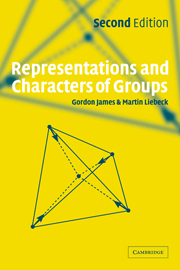Book contents
- Frontmatter
- Contents
- Preface
- 1 Groups and homorphisms
- 2 Vector spaces and linear transformations
- 3 Group representations
- 4 FG-modules
- 5 FG-submodules and reducibility
- 6 Group algebras
- 7 FG-homomorphisms
- 8 Maschke's Theorem
- 9 Schur's Lemma
- 10 Irreducible modules and the group algebra
- 11 More on the group algebra
- 12 Conjugacy classes
- 13 Characters
- 14 Inner products of characters
- 15 The number of irreducible characters
- 16 Character tables and orthogonality relations
- 17 Normal subgroups and lifted characters
- 18 Some elementary character tables
- 19 Tensor products
- 20 Restriction to a subgroup
- 21 Induced modules and characters
- 22 Algebraic integers
- 23 Real representations
- 24 Summary of properties of character tables
- 25 Characters of groups of order pq
- 26 Characters of some p-groups
- 27 Character table of the simple group of order 168
- 28 Character table of GL(2, q)
- 29 Permutations and characters
- 30 Applications to group theory
- 31 Burnside's Theorem
- 32 An application of representation theory to molecular vibration
- Solutions to exercises
- Bibligraphy
- Index
31 - Burnside's Theorem
Published online by Cambridge University Press: 05 June 2012
- Frontmatter
- Contents
- Preface
- 1 Groups and homorphisms
- 2 Vector spaces and linear transformations
- 3 Group representations
- 4 FG-modules
- 5 FG-submodules and reducibility
- 6 Group algebras
- 7 FG-homomorphisms
- 8 Maschke's Theorem
- 9 Schur's Lemma
- 10 Irreducible modules and the group algebra
- 11 More on the group algebra
- 12 Conjugacy classes
- 13 Characters
- 14 Inner products of characters
- 15 The number of irreducible characters
- 16 Character tables and orthogonality relations
- 17 Normal subgroups and lifted characters
- 18 Some elementary character tables
- 19 Tensor products
- 20 Restriction to a subgroup
- 21 Induced modules and characters
- 22 Algebraic integers
- 23 Real representations
- 24 Summary of properties of character tables
- 25 Characters of groups of order pq
- 26 Characters of some p-groups
- 27 Character table of the simple group of order 168
- 28 Character table of GL(2, q)
- 29 Permutations and characters
- 30 Applications to group theory
- 31 Burnside's Theorem
- 32 An application of representation theory to molecular vibration
- Solutions to exercises
- Bibligraphy
- Index
Summary
One of the most famous applications of representation theory is Burnside's Theorem, which states that if p and q are prime numbers and a and b are positive integers, then no group of order paqb is simple. In the first edition of his book Theory of groups of finite order (1897), Burnside presented group-theoretic arguments which proved the theorem for many special choices of the integers a, b, but it was only after studying Frobenius's new theory of group representations that he was able to prove the theorem in general. Indeed many later attempts to find a proof which does not use representation theory were unsuccessful, until H. Bender found one in 1972.
A preliminary lemma
We prepare for the proof of Burnside's Theorem with a lemma (31.2) which is concerned with character values. In order to establish this lemma we require some basic facts about algebraic integers and algebraic numbers, which we now describe. We omit proofs of these – for a good account, see for instance the book by Pollard and Diamond listed in the Bibliography.
An algebraic number is a complex number which is a root of some non-zero polynomial over ℚ. We call a polynomial in x monic if the coefficient of the highest power of x in it is 1.
Let α be an algebraic number; and let p(x) be a monic polynomial over ℚ of smallest possible degree having α as a root.
Information
- Type
- Chapter
- Information
- Representations and Characters of Groups , pp. 361 - 366Publisher: Cambridge University PressPrint publication year: 2001
